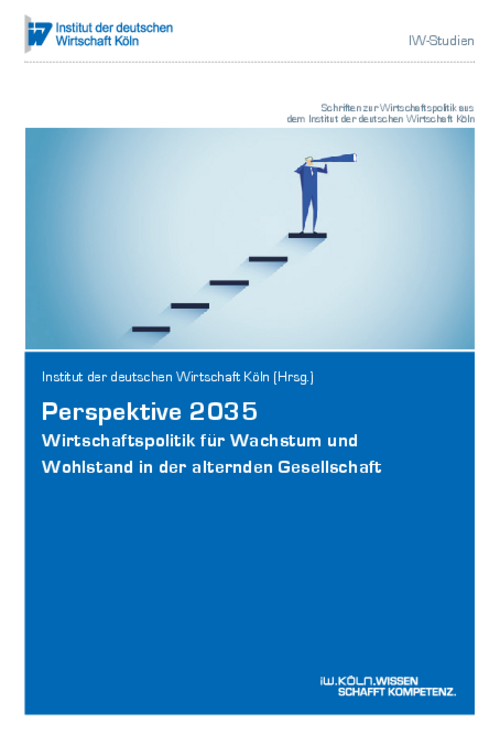Germany’s population is set to change significantly over the next few decades. Although it will not actually shrink in the foreseeable future due to the high level of immigration, ageing will have a significant impact. Within a few years the baby boomer generation will have retired, leaving gaps in the workforce too large to be filled by entry-level workers or skilled immigrants. Higher pension entitlements will have to be funded by a smaller number of contributors.

Perspective 2035: Economic Policy for Growth and Prosperity in the Aging Society
IW-Studie

Germany’s population is set to change significantly over the next few decades. Although it will not actually shrink in the foreseeable future due to the high level of immigration, ageing will have a significant impact. Within a few years the baby boomer generation will have retired, leaving gaps in the workforce too large to be filled by entry-level workers or skilled immigrants. Higher pension entitlements will have to be funded by a smaller number of contributors.
This demographic transition has darkened the outlook for Germany’s economy. By 2035 annual growth in gross domestic product (GDP) will have more than halved. The good news, however, is that this drop in growth can be reversed by an astute economic policy. The decline can be halted and economic momentum restored. After a period of weak growth, it should be possible to bring the annual increase in GDP back to its usual average level of just under 1½ percent, and perhaps even slightly increase it.
Policies which would be particularly effective in combating the consequences of deteriorating demographics include integrating and training immigrants, expanding employment and the volume of work, increasing capital investment, raising productivity, encouraging start-ups and digital innovation, and accelerating technical progress. Numerous other areas of government policy will be similarly affected: public budgets, the social insurance system and infrastructure will require adjustment, while education and innovation facilities will need to be upgraded for the digital age.
Coping with demographic change will require a concerted effort in all areas of policy. However, the aging of society does not mean that there will in future be less dynamism, change, curiosity or renewal. On the contrary, there must be more of all of these to offset the negative consequences of the demographic transition. Only with an agile economy and an agile society can the drop in growth looming in the wake of changing demographics be averted.

Institut der deutschen Wirtschaft Köln: Perspektive 2035 – Wirtschaftspolitik für Wachstum und Wohlstand in der alternden Gesellschaft
IW-Studie

More on the topic

Possible Developments in the Supply of Skilled Workers up to the Year 2040
The German labor market is on the verge of a fundamental upheaval. While the number of people in the labor force has risen steadily in recent decades, it is likely to drop significantly as soon as the baby boomers retire.
IW
The Social Situation of Young People from Non-German-Speaking Families
An analysis of the microcensus shows that in 2017, around 2.4 million children and adolescents in Germany lived in non-German-speaking households. This corresponds to 17.7 per cent of all minors (under the age of eighteen) and 47.0 per cent of those with a ...
IW